The pandemic changed TV chat shows forever, I hope
& how can we still have the death penalty now that the Parkland shooter isn't getting it?
10-20-2022 (issue No. 58)
Eric Zorn is a former opinion columnist for the Chicago Tribune. Find a longer bio and contact information here. This issue exceeds in size the maximum length for a standard email. To read the entire issue in your browser, click on the headline link above.
This week
Parkland sentencing decision should spell the end of the death penalty
News and Views — on the Tribune’s blue period and more
Land of Linkin’ — Where I tell readers where to go
Mary Schmich finishes the tale of her crazy summer of 1974
Re:Tweets — featuring the winner of the visual tweets poll and this week’s finalists
Songs of Good Cheer update — more numbers added to the program
Tune of the Week with guest nominator Brandon Pope
Last week’s winning tweet

Many people have stolen this tweet, but it appears that @Contwixt was the first to think of it.
The winner of the Dad Tweets poll is a joke that has been stolen so often I can’t tell where it originated: “Just got fired from my job as a set designer. I left without making a scene.” It narrowly edged out the similarly groanworthy “Return of the Jedi is not possible without the receipt of the Jedi” from @bornmiserable.
Here are this week’s nominees and the winner of the Tuesday visual tweets poll. Here is the direct link to the new poll.
Life for Cruz should spell the end of the death penalty
Sociopathic Nikolas Cruz plotted for months before he murdered 17 people in a Valentine’s Day 2018 shooting spree at Marjory Stoneman Douglas High School in the Miami suburb of Parkland. Last week, a sentencing jury decided to spare him the death penalty and instead gave him life in prison without the possibility of parole.
That decision, which outraged and confounded many family members of his victims, ought to put an end to capital punishment in America.
If someone who methodically slaughters 17 people doesn’t get the death penalty, how can society ever justify executing someone convicted of just one or just a few murders? There is no proportion in that, no fairness, no justice writ large.
The jurors who held out against the death penalty — there were reportedly three — found sufficient mitigating factors in his life story. From The New York Times:
Lawyers defending the gunman … focused on aspects of his life that they said had left him a damaged person from birth, with a slew of developmental problems and sometimes violent behavior that overwhelmed his adoptive mother.
Melisa McNeill, the lead public defender in his sentencing trial, told jurors during her closing argument on Tuesday that (Cruz) had been “poisoned” by his biological mother’s heavy drinking while she was pregnant with him. That, Ms. McNeill argued, had led to fetal alcohol spectrum disorder, which was misdiagnosed by experts throughout Mr. Cruz’s life.
Truth is, though, that just about every murderer suffers from mental disorders, almost by definition. They are products of their environment, of circumstances, of faulty wiring in the brain. And, of course, the vast majority of victims of fetal alcohol syndrome and misdiagnosed behavioral issues don’t go on to murder even one person.
This was no fit of rage, no impulsive act, no manifestation of temporary insanity. It was as coldblooded as murders get.
I take no pleasure in the sentencing decision. My long-standing opposition to the death penalty is not rooted in sympathy for killers or adherence to sanctity-of-life arguments, but rather a number of factors, of which its arbitrary nature, so glaringly on display here, is just one.
The others include:
The fallibility of the justice system
Yes, Nikolas Cruz pleaded guilty, and there is no doubt he was the gunman. But Rolando Cruz — no relation — was not guilty when he and a co-defendant were sentenced to die in 1985 for a murder that it later turned out was committed independently by another man.
Police, prosecutors, judges and juries are only human and sometimes they get it wrong. The Death Penalty Information Center reports that “since 1973, more than 185 people have been released from death row with evidence of their innocence.” We must give officials the power to enforce the law and punish those convicted of crimes, but it’s reckless and unnecessary to give them the power of life and death.
The lack of a deterrent effect
Study after study has confirmed the intuitively logical truth that murderers seldom if ever perform a cost/benefit analysis regarding a potential death penalty before they decide to kill.
A Death Penalty Information Center study of 30 years of FBI Uniform Crime Report homicide data found that the South has consistently had by far the highest murder rate. The South accounts for more than 80% of executions. The Northeast, which has fewer than 0.5% of all executions, has consistently had the lowest murder rate.
The expense
The additional costs of putting on capital trials and arguing the mandatory appeals are far higher than the costs of housing a convicted killer in a conventional prison for the rest of his or her life. Here are just a few studies and reports from the Death Penalty Information Center:
• Oklahoma capital cases cost, on average, 3.2 times more than noncapital cases.
• Defense costs for death penalty trials in Kansas averaged about $400,000 per case, compared to $100,000 per case when the death penalty was not sought.
• Enforcing the death penalty costs Florida $51 million a year above what it would cost to punish all first-degree murderers with life in prison without parole. Based on the 44 executions Florida had carried out since 1976, that amounts to a cost of $24 million for each execution.
And there’s the additional issue that those convicted of murdering white people are more likely to get the death penalty than those convicted of murdering Black people, a statistical artifact that criminologists debate the significance of.
In short, the death penalty is an arbitrary, error-prone and possibly racist government program that costs a lot and doesn’t produce any tangible results.
After Nikolas Cruz was sentenced to life without parole, Andrea Ghersi, sister of Parkland shooting victim Joaquin Oliver, was distraught. “If not now the death penalty, then when?” she asked reporters. “When?”
Never seems like the right answer.
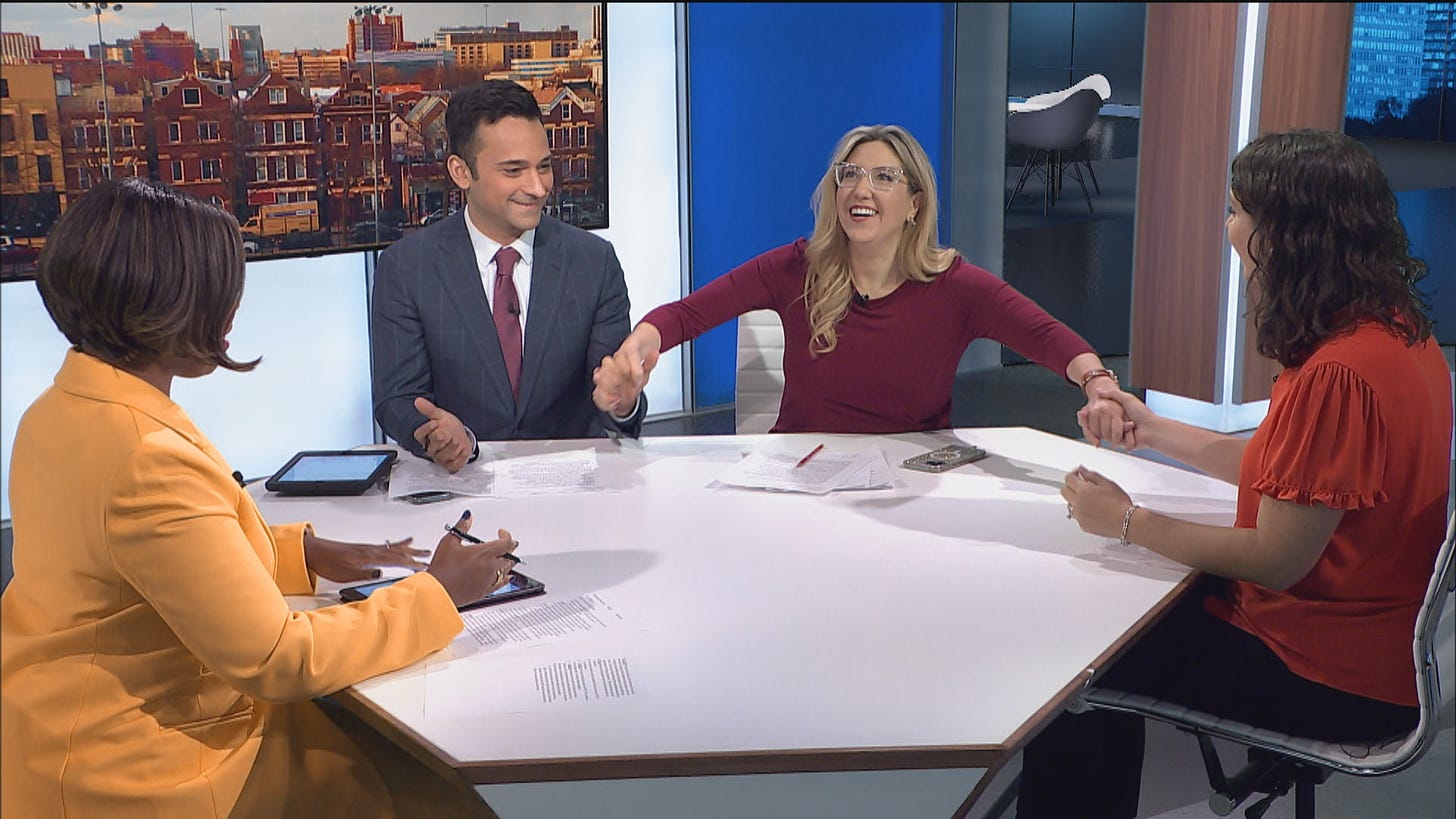
How the pandemic changed TV chat shows forever
From mid-March 2020 until earlier this month, WTTW-Ch. 11’s flagship weekday news talk program “Chicago Tonight” conducted guest interviews and convened panels of experts entirely on the Zoom teleconferencing program.
Even members of the show’s reporting team beamed in live from their homes, protecting themselves from the threat of COVID-19 as it tore through the population.
The results were mixed, as they were on many national broadcast and cable talk shows that typically relied exclusively on in-studio guests.
Zoom chats often had low-resolution images and suboptimal lighting. Guests who used built-in computer microphones sounded like they were speaking in a tiled bathroom. Balky Wi-Fi caused occasional hiccups in the feed, and conversations could seem stilted when panelists failed to exchange nonverbal cues.
But the advantages were quickly apparent. “Zoom opened up a whole new range of possibilities for us,” said Jay Smith, the station’s news director and the executive producer of “Chicago Tonight.”
“In the past, it was hard to get guests to come to our studio (on the campus of Northeastern Illinois University on Chicago’s Northwest Side) from the far suburbs,” Smith said. “We were asking for a lot of their time. But with Zoom, we were only asking for about 15 minutes during which they could sit in their kitchens wearing shorts and talk to us.”
Smith said, “It was much easier to mix local and national experts on the program when we went to Zoom. We were much better able to cover late-breaking stories when we didn’t have to worry about getting people into the studio, and it democratized our bookings because a lack of adequate transportation options was no longer a barrier to including someone on the program.”
Prior to the pandemic, “Chicago Tonight” occasionally featured guests via satellite — an expensive proposition, Smith said — or by Skype, “which was always a hassle for our control room.” But more than two years of using Zoom has opened the program’s mind to hybrid production incorporating remote and in-studio guests.
“Face to face is always best,” Smith said. “Body language, eye contact, facial expressions and other clues help people know whose turn it is to speak. But now” — in the station’s newly redesigned studio with a large video screen — “we can have the best of both worlds. It’s a new way of thinking.”
As a viewer and avid consumer of punditry, I’d rather see and hear the best guests on a given topic rather than simply the ones who had big enough gaps in their schedules to fit in a live studio appearance.
And the fact that Zoom appearances have become standard has thrown the excuse that an organization or cause “was unable to send a representative” into sharp relief. Those who don’t appear under such circumstances aren’t unable to join the conversation; they are unwilling to do so.
News & Views
News: Tribune Editorial Board endorses a raft of Democrats up and down the ballot.
View: I’m sure there are many loyal readers out there who are wondering what the hell happened to the moderate-Republican Tribune Editorial Board, which as of Thursday morning has given the nod to Democrats for every statewide constitutional office plus U.S. Senate, Cook County Board presidency and 10 area U.S. House races so far
I certainly can’t remember such a geyser of blue ink from the Board in more than 40 years of reading the paper and working there.
Understandably the small group that writes the endorsements took a pass on the daffy Republican nominees at or near the top of the ticket — gubernatorial candidate Darren Bailey and attorney general hopeful Tom Devore come to mind, symbols of a deeply dysfunctional, ideologically derailed state party.
But it also said no to candidates who looked awfully Trib-friendly to me, such as Chris Dargis —running against Democratic incumbent U.S. Rep. Raja Krishnamoorthi in the 8th District —and state Rep. Thomas Demmer, who is challenging incumbent Democratic treasurer Michael Frerichs.
Now. Shouldn’t I be saying, “So what?”
I offered a lengthy argument against the whole idea of newspaper endorsements last week, and on Tuesday, I posted a collection of reader responses, most of which said they’re glad newspapers offer guidance in down-ballot races. I’d argue that such guidance could be and should be provided in bylined, staff-written opinion essays, given that it’s misleading to present such endorsements as a product of a large group.
I’d hoped to present in today’s edition a broader defense of endorsements and “institutional” voices of newspapers from someone in the business, but though I put out several invitations for dissent, no such defense arrived in my inbox or appeared in the comment thread.
The offer still stands.
Meanwhile, if the Tribune still feels it must endorse, I applaud the trend here.
News: Republican candidate for Illinois treasurer Tom Demmer features a petition on his website that reads, “Do you agree that we should protect, NOT tax, Illinois citizens’ retirement? Let Tom know you stand with him!” Incumbent Democrat Michael Frerichs fires back, “I do not support and will not support the retirement tax. My opponent knows this.”
View: Pandering cowards, the both of them! Illinois is one of only three states that has a state income tax but exempts Social Security, pension, IRA and 401(k) income from taxation. Sure, some seniors live close to the edge on fixed incomes. But others are flush and can easily help share the burden of funding state government.
News: Former ABC 7 political reporter Charles Thomas has disappointed his former colleagues in Chicago media by promoting Republican gubernatorial candidate Darren Bailey in TV commercials.
View: Many former journalists cross over into political consulting, which is a form of advocacy, and speak out on behalf of their client candidates. My former colleague David Axelrod comes immediately to mind. But for Thomas to use his former credentials in a commercial — “For 25 years, ABC-7 political reporter Charles Thomas gave you the straight news,” says the narrator. “Now he’s giving you real talk on the governor’s race” — in an attempt to give extra credibility to his promotion of a candidate degrades his former station and his reputation.
News: Chicago mayoral candidate Willie Wilson paid $10,000 for “writing and consulting” to a company managed by disgraced former federal inmate and Gov. Rod Blagojevich.
View: If you’re seeking political advice from Blago, you’re worse than a fool. I’ve got some free advice for Wilson, though: Move to a ward in which you have a lot of support and run for City Council. Get some legislative experience to illustrate that you have better judgment than is suggested by your decision to consult with GRod.
News: Facebook is shuttering Bulletin, ending its attempt to compete with Substack and other newsletter services.
View: I briefly considered signing on with Bulletin instead of Substack (this platform) when I started the Picayune Sentinel, but the dealbreaker for me was that sponsoring subscribers were directed to use Facebook Pay (now Meta Pay), which I know for many people is incursion too far by Facebook into their lives.
Land of Linkin’
VoteForJudges.org is a useful site that aggregates the various bar association recommendations. The Girl I Guess Progressive Voters Guide might help you make your decision. Same with Injustice Watch.
I’m happy to report that WLS-AM host Bill Cameron’s “Take 1” local news-chat podcast, the successor to the long-running “Connected to Chicago,” is now in conventional podcast feeds. Regular panelists include Ray Long, Greg Hinz and Heather Cherone.
“One well-tested method to get to know someone is the Proust Questionnaire. Notably taken by French novelist Marcel Proust twice, it provides the perfect framework to better understand the deep motivation of a person.” The 35 questions include: What is the trait you most deplore in yourself? What is your greatest extravagance? What do you consider the most overrated virtue? What do you most dislike about your appearance? If you could change one thing about yourself, what would it be? What do you consider your greatest achievement? What is your greatest regret? How would you like to die?
NameGrapher — Explore the historical popularity of United States baby names. This is one of my favorite sites to poke around.
What does my phone number spell? This tool can come up with a mnemonic to help people remember your number, assuming anyone is bothering to try to remember phone numbers anymore.
The Picayune Sentinel on the air: On Thursdays at 4:30 p.m., WCPT-AM 820 host Joan Esposito and I chat about ideas raised in the new issue. The listen-live link is here.
The Picayune Sentinel preview: Tuesdays at 11:30 a.m. I talk with WGN-AM 720 host John Williams about what’s making news and likely to be grist for the PS mill. The WGN listen-live link is here.
A recent Tribune article on progressive mayoral hopefuls noted as an aside that activist Ja’Mal Green “argued the CTA should be free.” Should it? I explored the question in Tuesday’s Picayune Plus. Become a paid subscriber and have Plus delivered to your in-box each Tuesday. You will also get access to the comments scrum.
Word Court
Last week I wrote:
In 2016, John McCormick, then deputy editor of the Tribune’s Editorial Board, told the Columbia Journalism Review, “Swaying votes is only one reason for endorsing, and arguably not the most important. Every few years, endorsements bring a publication to full stop. They explain to the world what that publication is, what it advocates, how it thinks, what principles it holds dear.”
But that begs the question of why a newspaper’s journalism — its news reports, its coverage decisions, its mix of opinions in staff and guest columns — doesn’t suffice to reflect the values that the entire paper holds dear, the paper that exists today, not one rooted in a founding dogma or, at some papers, the whims of an owner or publisher.
Several readers accused me of misusing the expression “begs the question,” which has, in our age of DIY grammar and slipping standards, become a substitute for “suggests the question” or “poses the question.”
Formally speaking, to beg a question is to assume the conclusion of your argument in your premise. Examples at YouDictionary.com include:
Freedom of the press is one of the most important hallmarks of a modern, open society because modern, open societies value the ability of the press to report what’s happening.
I am confident that God exists because it says so in the Bible. And the Bible contains God’s word.
I was mortified at the accusation that I had erred and so pleaded my case to Peter Sagal of Highland Park, host of the long-running NPR game show “Wait Wait … Don’t Tell Me” and a flinty defender of the proper meaning of question begging. I sent him the above paragraph and argued:
By assuming that a publication ought to be espousing principles, McCormick was assuming the answer -- "It should!" to the question that I pose in the next paragraph. Your ruling?
Sagal’s reply:
My ruling: Allowable but grammatically flawed by your use of “of.” You should have written something like: “This begs the question. Why doesn’t a newspaper’s journalism…” etc. By using “of,” it reads like the incorrect usage even though it isn’t. So have I ruled.
Now for your verdict:
Mary Schmich: Part II of ‘My Craziest Summer’
My former colleague Mary Schmich posts occasional column-like entries on Facebook. Here, reprinted with permission, is her most recent offering, a follow up to Part I of “My Craziest Summer,” which appeared in PS 42:
A few weeks ago I wrote about an adventure I had in France in 1974, when, at the end of my Pomona College semester abroad, I took a job as a cook on a little yacht that was sailing through the south of France from the Atlantic to the Mediterranean. I was joined by my friends Pam and Diana.
I use the words “job” and “cook” with a raised eyebrow because, as previously recounted, it turned out the three middle-aged Frenchmen on the little yacht were hoping for more than cooks.
We dashed their hopes, however, and, eventually, after sailing down the Garonne River and the Canal du Midi, bid them adieu.
As previously promised—and because some of you have been nice enough to ask—here’s what happened next:
Our sailing adventure was over. It was early June. I took a train from Marseilles back to Paris.
Meanwhile, back home in Phoenix, my family — whom I loved dearly — was crammed into a little rental house. I didn’t want to spend the summer there, so when my fellow semester-abroad students headed home, I decided to stay in France. That meant I forfeited my ticket back to the States.
In Paris, I spent a couple nights on the floor of a hotel room of a college friend named Charlotte. Then Charlotte, too, left.
And there I was. Alone in gay Paree. No friends. No lodging. No money. I mean no money. Zero. Rien.
What I did have was hope. At the end of the boat trip, the Commandant Jacques Dore, who owned the little yacht, told me that in a week or two, when he returned to Paris after a sail around Corsica, he’d get me a job. He’d given me his home phone number. And a business card.
I figured I could hang on til then. I had the phone number of the friend of a friend who lived in a Paris suburb, and — on the day I realized I was flat broke — I thought well, I’ll call and ask if I can stay with her.
One problem: I didn’t even have money for the call.
So I summoned all my courage, went to a Metro station, stuck out my hand. And begged.
Let me tell you. Begging is humiliating. It’s even more humiliating when no one gives you money. I quickly gave up and headed to the American Express office on Rue Scribe.
In those days, the Paris AmEx office was a gathering spot for young travelers from around the world. On any given day, dozens of wanderers lounged on the sidewalk out front, with their backpacks and their guitars, sipping Nescafé, trading drugs, waiting for their parents to send them traveler’s checks. My parents had no money to send.
American Express was also where traveling Americans picked up their mail. Remember, this was 1974. No cell phones. No Internet. No ATMs. When you were abroad, you were really gone.
An added attraction at AmEx: You could go to the bathroom. And brush your teeth. And — I hoped — find someone to lend you a couple of francs for a phone call.
I was jittery and hungry the day I approached the American Express crowd. I stuttered out a plea. A couple of guys in the crowd gave me a skeptical look. Right. You’re broke. Someone laughed.
But then 6 francs were pressed into my hand. Humiliated and grateful, I walked off, crying.
I hadn’t gone far when I heard a voice. “Hey! Wait a minute! What’s wrong?” I turned around and there was a guy with long dark hair, a beard, mustache. Cute. He reminded me of the singer Cat Stevens.
I sniffled. He put a hand on my shoulder and told me to come back to the crowd.
His name was Fred. Fred was bunking in a van with another guy named ... Fred.
(I know. Just when you think this story can’t get more absurd. But it’s all true and even if my memory didn’t serve me well, I have proof. I wrote all this down in a little black journal given to me by my college friend Kathy. She couldn’t have guessed when she inscribed it (see photo above) exactly how crazy these adventures would be.)
Back to the story:
When I explained my situation, the Freds told me I could stay with them until the Commandant reappeared.
So for a while I lived in a van with two guys named Fred. Every day, we parked outside AmEx. Every night we parked on the banks of the Seine, with a view of the Eiffel Tower and the sound of the tourists on the passing bateaux mouches.
During the long days, I routinely walked to the nearby PTT—the post, telephone and telegram office—and called the Commandant’s home in San Malo, collect. He was never there. Eventually, a woman on the other end told me to STOP CALLING.
I took to calling the number on his business card. After several fruitless days talking to a secretary, a man came on the line and demanded, “Who are you?”
I explained. He laughed. Not a mean laugh. Just an “Ah, ma pauvre jeune fille” laugh. My poor young girl.
His name was Hubert de Bouville. The Commandant’s partner in a maritime business. He said it could be a long time before the Commandant returned. But that he’d help me.
There’s a lot more to this story, but not for now. Suffice it to say that thanks to Monsieur Hubert de Bouville, I became a fille au pair, taking care of three kids in a Normandy country house. And by the end of the summer, I’d earned enough money to buy a ticket home.
Epilogue: When I got back to Pomona College for my senior year, I was changed.
Frankly, I was a little shell-shocked and scarily thin. “You look like s***” one of my brothers cheerfully said when he saw me.
But I was also newly focused and determined. For the first time I knew — really knew— that I could take care of myself no matter what. I also think that summer helped me know that I could be a journalist, that I could go into unknown situations and get a story out of it.
I could extract several morals from this story but here are two:
One: Sometimes the hard things that happen to you are the ones that help you grow the most.
Two: When life is really crazy, keep a journal. Without it, even you wouldn’t believe the things you lived through.
Minced Words
Mark Bazer of “The Interview Show” joined host and birthday boy John Williams, Austin Berg and me for this week’s episode of “The Mincing Rascals.” Most of our time was spent on issues raised at Tuesday night’s gubernatorial debate between incumbent Gov. JB Pritzker and Republican challenger Darren Bailey. Subscribe to us wherever you get your podcasts. Or bookmark this page. If you’re not a podcast listener, you can now hear an edited version of the show at 8 p.m. most Saturday evenings on WGN-AM 720.
Re: Tweets
In Tuesday’s paid-subscriber editions, I present my favorite tweets that rely on visual humor and so can’t be included in the classic Tweet of the Week contest in which the template for the poll does not allow the use of images. Subscribers vote for their favorite, and I post the winner here every Thursday:
The new nominees for Tweet of the Week:
(At Medieval Times) Me: Maybe I should’ve been more forthcoming when I told you I was taking you to an off-Broadway show. Her: … Me: Bite of my turkey leg? — @Shade510
I’m Mom. You might remember me from such hits as “Wear whatever you want” and its sequel, “No, not that.” — @mommajessiec
If your girlfriend asks if you would still love her if she was a worm, just say yes. She will never be a worm. You will never actually have to deal with that. But otherwise you will have to deal with a girlfriend who thinks you wouldn't love her if she was a worm, and she is mad. — @elle91
My neighbors have just bought the sexiest damned ox I have ever seen. And that's me breaking my last commandment! — @wildethingy
Of course I listen to podcasts. What am I supposed to listen to? My own thoughts? Oh, dear God, no. — @mommajessiec
Every day I microwave a spider and then let it bite me. Nothing. This is bullshit. — @Jake_Vig
Dear wine: We had a deal. You were to make me funnier, sexier, smarter and a better dancer. I saw the video. We need to talk. — @SassyCanadian0
If by yoga you mean reaching the outlet to plug in my charger without getting out of bed, then yes, I do yoga. — @oneawkwardmom
Please stop reducing me to a one-dimensional cartoon villain. I take good photos, adore dogs, can be very kind and understanding, love cooking, and only occasionally roast small children in my giant oven. — @LoveNLunchmeat
My dilemma with religion is that my idea of Heaven consists of everything they'd send me to Hell for. — @SundaeDivine
Vote here in the poll. For instructions and guidelines regarding the poll, click here.
Cheer Chat
Our program is almost set for Songs of Good Cheer 24. On the list, Anna Jacobson will lead the hauntingly beautiful “Huron Carol,” which she last sang for the show in 2015, and Aaron Smith will present the country classic, “Christmas Time’s a’ Comin’.”
There will be plenty of very familiar holiday material, too. So come sing with us!
Shows:
Friday, Dec. 9, 7:30 p.m.
Saturday, Dec. 10, 3 p.m.
Saturday, Dec. 10, 7:30 p.m.
Sunday, Dec. 11, 4 p.m.
Call 773-728-6000, go online or visit the box office in person at 4544 N. Lincoln Ave. A portion of proceeds benefits the McCormick Foundation Communities Fund.
Tickets are $50 for the general public and $48 for Old Town School members, and they tend to sell out quickly.
Tune of the Week
This week’s guest nominator is Brandon Pope, frequent panelist on “The Mincing Rascals,” host of WCIU-TV’s “On the Block” and host of the new season of WBEZ-FM’s “Making” podcast.
Pope sent along this song and quoted the lyric, “Never looking back or too far in front of me. The present is a gift. And I just want to be.”
Consult the complete Tune of the Week archive!
The Picayune Sentinel is a reader-supported publication. Simply subscribe to receive new posts each Thursday. To support my work, receive bonus issues on Tuesdays and join the zesty commenting community, become a paid subscriber. Thanks for reading!








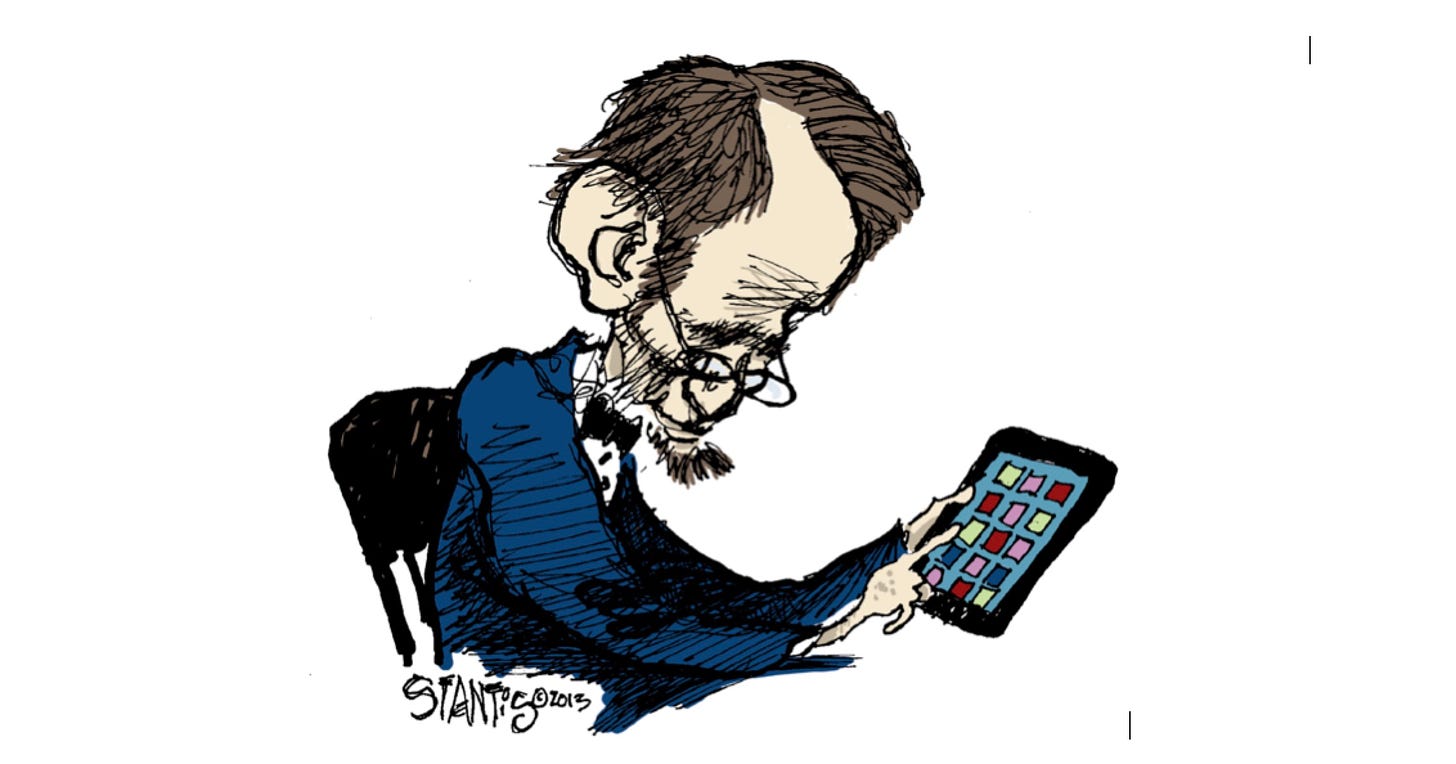
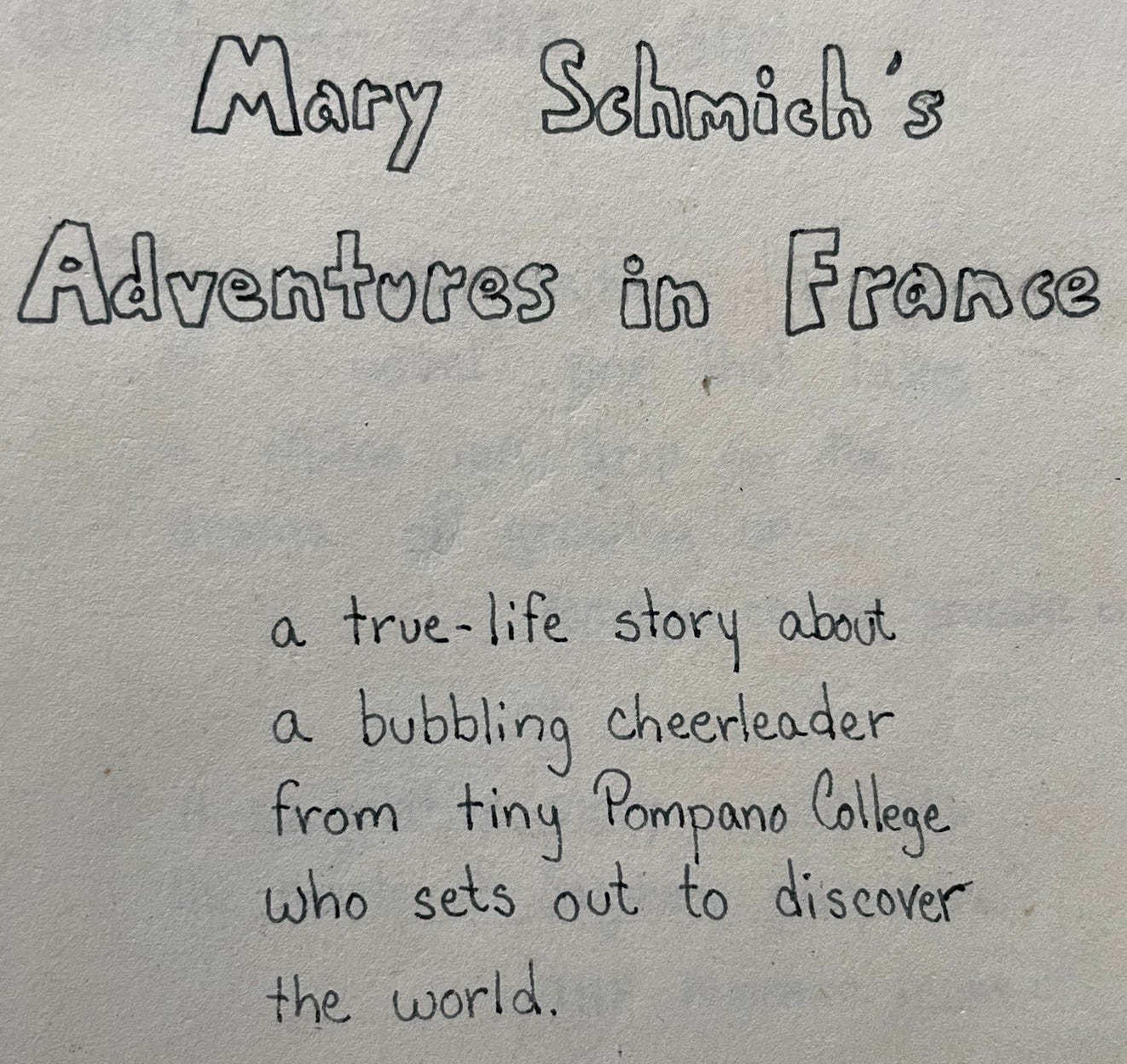
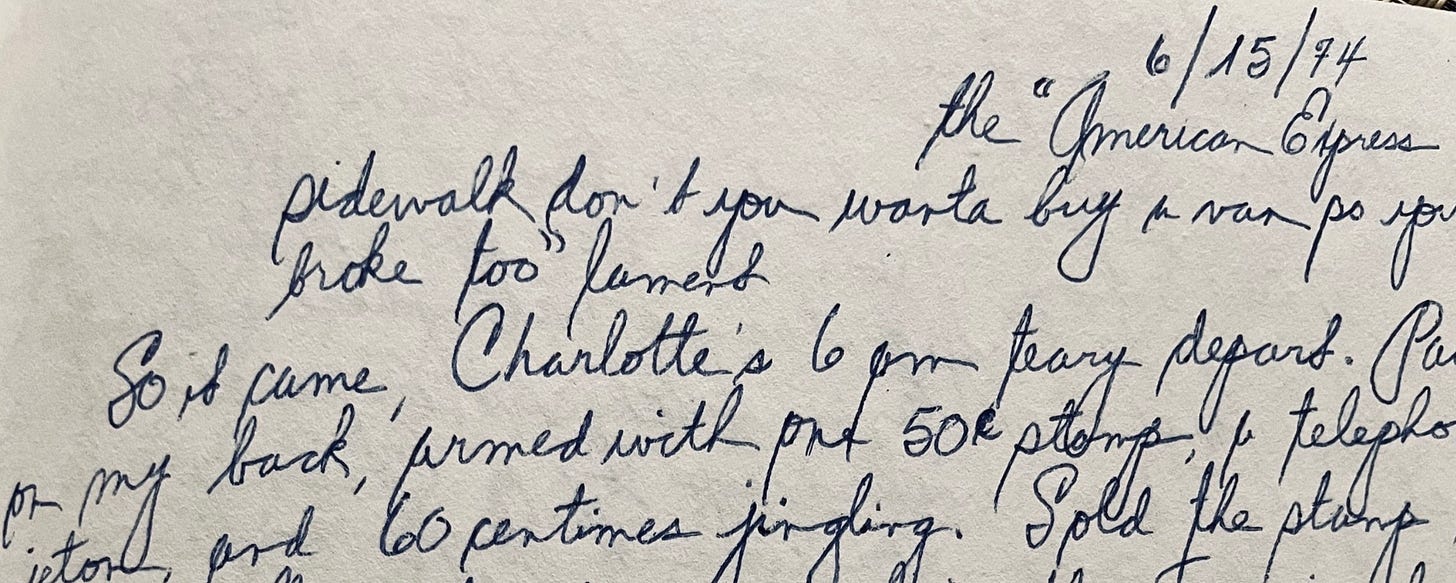



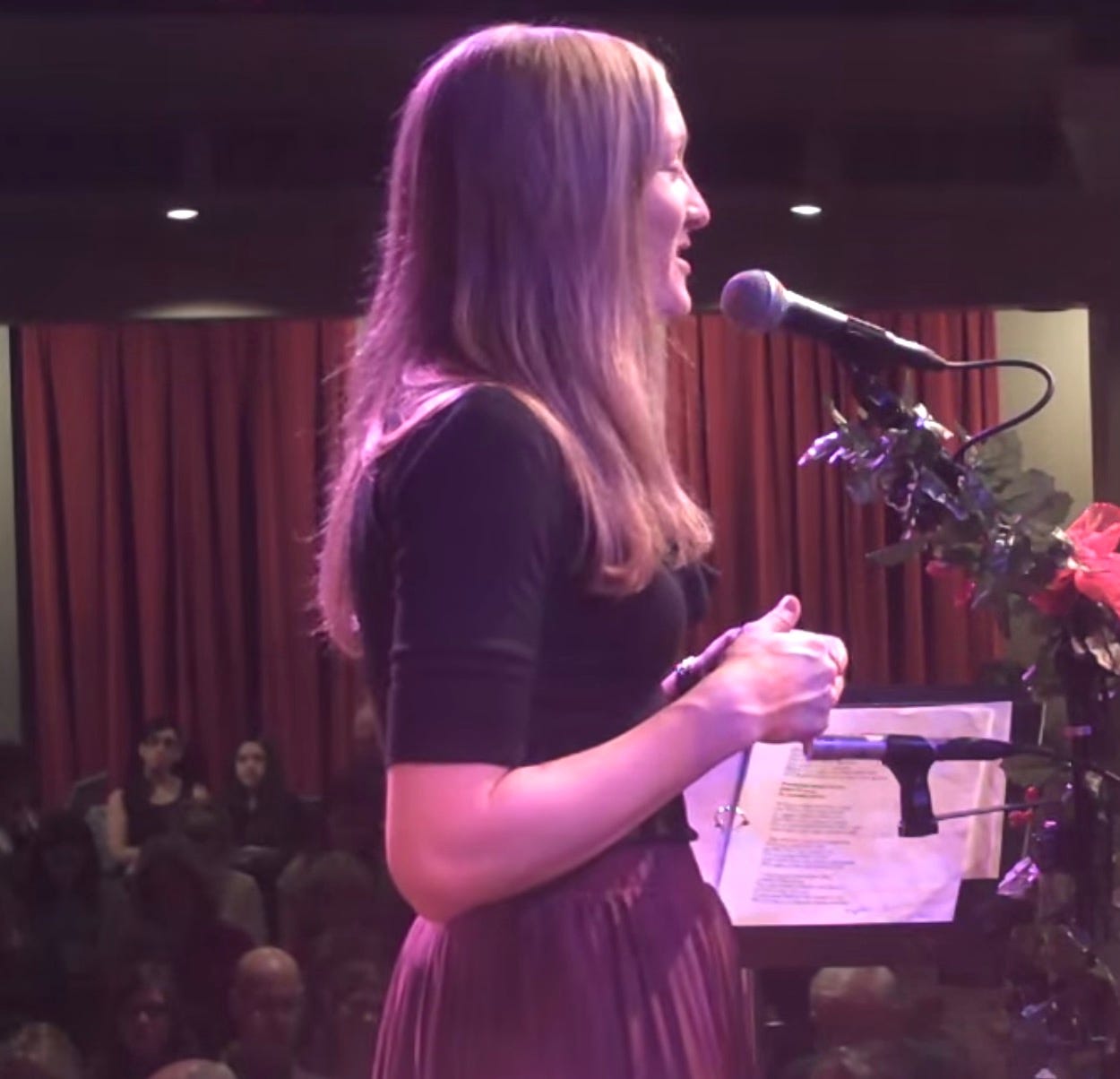

If we didn't insist on preserving archaic grammar rules, how else would we know who is better than whom?
It is indeed a noteworthy anomaly that Illinois, which taxes virtually everything else that moves or is stationary at a draconian rate, conspicuously does not tax retirement income. I've always suspected the answer for this lies in the fact that the public employee unions which essentially control illinois, presently have over 10,000 retirees with retirement income in excess of $100,000. I believe these folks do not want their very lucrative pensions to be touched by state taxes, and they have the clout to prevent it from happening while everything else is taxed at an exceedingly exorbitant rate.